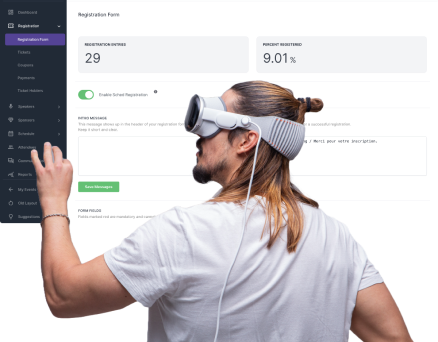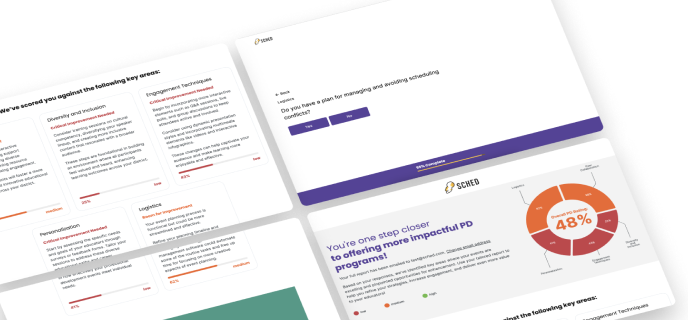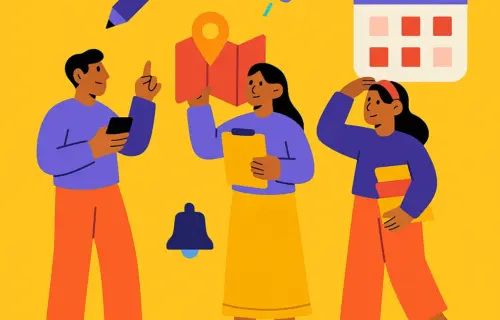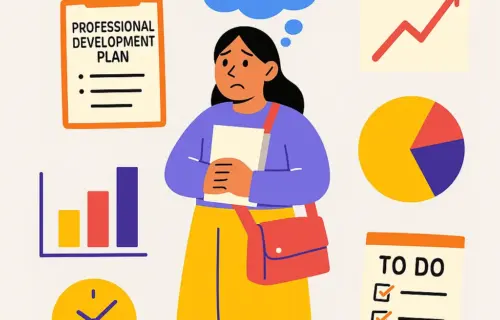You have your work cut out for you when planning an education industry event. You need to come up with your theme, set a budget, choose a venue, and so much more. You’ll also need to think about creating a sense of excitement about the event.
You’ll need to get the word out to potential attendees through conference marketing and one key to success there is a catch conference title.
Of course, coming up with conference titles can be hard. You want something effective, evocative, and engaging, but you also need to be concise. If you’re struggling to create titles that grab attention, we can help. In this guide, we’ll explore what you need to know about creating catching conference session titles.
TL;DR
Table of contents
- 1 TL;DR
- 2 Why You Need Catchy Conference Titles for Your Events
- 3 How to Come Up with Engaging Conference Title Ideas: Your 7-Step Guide
- 4 5 Examples of Catch Conference Session Titles
- 4.1 1. CAUDLeading the Way: Inclusion, Access, Equity
- 4.2 2. Health and Wellness in the Workplace: Strategies for Success
- 4.3 3. Women in Leadership: Breaking Barriers and Empowering Change
- 4.4 4. Shaping the Future: Trends and Insights for Tomorrow
- 4.5 5. The Power of Storytelling: Crafting Compelling Narratives
- 5 Creating Great Conference Titles: Key Takeaways
- Boring conference titles can turn off potential attendees and color their perception of your event.
- Catchy conference titles can communicate much more than the event’s nature, and tie into its theme, and more.
- Coming up with great conference title ideas isn’t hard when you use the right formula.
Why You Need Catchy Conference Titles for Your Events
Why do conference titles matter? Do people really pay any attention to them? The truth is that your conference title performs many jobs. It informs people about the nature of the event. It also ties into your event’s theme and expresses that in an engaging, attention-grabbing way.
Here are a couple of real-world examples:
- Science on the Grand 2024: This is a STEAM conference for grades K-12 held in Grand Rapids, Michigan).
- ILA Future Forward Leadership Summit: This is a leadership conference focused on the next 25 years.
Both of those examples do a great job of connecting the title to the event’s theme and being very memorable. You need to achieve the same goals with your conference titles.
How to Come Up with Engaging Conference Title Ideas: Your 7-Step Guide
Coming up with catchy conference titles doesn’t have to be a chore. It just requires a little creativity and the right framework. Our seven-step guide takes you through all the considerations you’ll need to make to create compelling titles that grab attention for all the right reasons.
1. Know Your Audience
The first step in crafting catchy conference titles is relatively simple: know your audience. For instance, if you’re a professional development provider, then your audience is educators. These are the people you need to craft your title for, and you’ll need to ask some specific questions while doing so. These include:
- Who makes up the bulk of your audience?
- What are your audience’s needs and goals?
- What challenges prevent them from satisfying those needs or reaching their goals?
- What are their expectations when it comes to education industry conferences?
- What are their preferences and how do they align with their expectations?
- What piques their curiosity or taps into their emotions?
When you truly understand your audience, it becomes easier to create conference titles that spark their interest and make them want to sign up to attend.
2. Clear, Concise, Catchy & Creative
What’s a great title for a conference? Look back at the two examples we used earlier. Both are clear, concise, catchy, and creative. They are excellent examples of using the 4 C’s. So, how do you do the same thing for your event title? Let’s break each one of the C’s down for easier understanding.
- Clear: Clear conference titles communicate the point of the conference and its theme in unambiguous terms.
- Concise: Concise conference titles omit unnecessary words and have a punchy delivery.
- Catchy: Catchy conference titles are memorable and evocative and can use things like humor, alliteration, and more.
- Creative: Creative conference titles are unique and not clichéd.
3. Test, Test, Test
Your job’s not done once you come up with a title. Think of this as your prototype. Now you need to refine it. Put that title through several rounds of testing. What are you looking for during these tests? Here are some of the things to consider:
- How does the title look in type? What about in different fonts?
- How does the title read? What does it communicate to your audience?
- Say the title aloud. How does it sound? Does it roll off the tongue or do you stumble pronouncing it? (Hint: you don’t want a title that’s tough to say).
- Get input from others, including members of your audience. What are their thoughts on it?
Once you’ve gotten some input and had time to test your title, refine it further. The goal is to ensure that it’s as effective as possible. And then you need to think about a subtitle for it.
4. Subtitles Expand Your Abilities
Here’s another important tip to help you create compelling conference titles and catchy conference session titles: use a subtitle. Subtitles come after (or below) your primary title and expand on the message communicated in the former.
Here’s an example from a non-education-related conference:
Position for the Next Market Shift
Get Rid of Great-Recession-Thinking and Position Yourself for a Shift
Or consider this example:
Leadership Unleashed: Navigating Tomorrow’s Challenges
Strategies, Insights, and Tools for Thriving in an Ever-Changing Landscape
Use your subtitles strategically to expand on the information in your title and build interest in the conference.
5. Keywords Matter
Once upon a time, no one had to worry about keywords. Well, at least in the SEO sense of things. Today, that’s not the case. Your conference title needs to be SEO-friendly since it’ll be used in your conference marketing efforts. The key to that is to use the right keywords in it.
For those who don’t moonlight as digital marketers, let’s define what a keyword is. It’s nothing more than a word or phrase that your target audience might use to find conferences like yours or when researching a related topic online.
Let’s say that you’re planning a professional development conference for K-12 teachers. To find information like that, your audience will likely search for something like “continuing education requirements” or “teacher CE requirements”. You get the idea.
Keywords help in several ways:
- They make your conference more discoverable online
- They help highlight your page’s relevance to search intent
- They help communicate the purpose of your conference to your audience
Don’t get carried away here. Using too many keywords will backfire on you. Limit the number you use in your title and make sure that they’re relevant, specific to your topic and audience, and that they’re actively being used.
6. Skip the Mi$tAkEs
Have you ever hit send on an email and immediately realized that there was a major spelling error in your message? Now imagine that your misspelling isn’t just being seen by a coworker or director but by hundreds or even thousands of potential conference attendees.
Mistakes can be incredibly costly, and they make your organization look unprofessional and unprepared. Do yourself and your conference a favor – skip the mistakes. But what types of mistakes are we talking about? It’s not just typos and misspellings. Other things to watch for include:
- Incorrectly used words
- Vague/misleading statements
- Offensive words
- Titles that are too long/short
Save yourself and your organization by spending a little time doing quality control before finalizing your conference title.
7. Tap into AI
AI tools can help you streamline the conference title creation process, making it more efficient and effective, while allowing you to focus on other aspects of event planning.
With Sched’s built-in AI tool, creating compelling, effective conference titles is instantaneous. It delivers immediate, captivating content that draws in potential attendees while you can handle more critical tasks.
5 Examples of Catch Conference Session Titles
We’ve discussed the importance of catchy conference session titles and provided a framework to help you create them. But chances are good that some readers are still a little unclear about what constitutes a “catchy” conference title versus one that’s not so great. What makes a good title? Sometimes you just need to see some real-world examples. We’ve highlighted a few of those below.
1. CAUDLeading the Way: Inclusion, Access, Equity
Concise, compelling, and engaging, this conference title hits all the right notes. It’s also got some wordplay to help make it fun. But what about the session titles? This event had some pretty memorable ones, including:
- Creating a District Wide Continuum of UDL and Applying Integration of Hands-On Learning
- Playful Beginnings, Purposeful Futures; Universally Designed College & Career Readiness Through Inclusive Early Childhood Experiences
- Developing Inclusive Behavior Systems: How U.D.L. and P.B.I.S. Align
- Empowering the Whole Child: Uniting Universal Design for Learning and Social-Emotional Learning
As you can see, these are catchy conference session titles that convey a lot of information about what each session will include.
2. Health and Wellness in the Workplace: Strategies for Success
Workplace wellness is a relatively new topic that’s been growing in importance for the last few years. Long hours, job stress, and a lack of work-life balance can make it more than a little challenging for employees to maintain their health and wellness.
This conference title highlights the problem (health and wellness in the workplace) and tells you exactly what will be addressed (strategies for success).
It’s easy to imagine what sorts of speakers might be present here, including healthcare professionals, mental health professionals, wellness experts, fitness specialists, nutritionists, and others.
3. Women in Leadership: Breaking Barriers and Empowering Change
In a world where women still occupy less than half of all leadership positions, a conference like this is a necessity. It communicates exactly what it’s about: addressing gender equality, not just in the workplace, but in leadership positions (CIO, CEO, etc.).
Topics that might be discussed based on the title include gender bias, leadership development, mentorship, sponsorship, and how to lead while also maintaining a healthy work-life balance.
Attendees would also likely expect the conference to provide tools to help foster the change mentioned in the title, as well as resources for breaking down barriers.
4. Shaping the Future: Trends and Insights for Tomorrow
This is a general futurist/technologist/innovator conference. As the title suggests, it’s about identifying emerging trends and predicting those still to come to help make the future brighter. It’s not so much about looking into a crystal ball as it is about using experience, expertise, and insight to predict what’s likely to come.
Attendees would be well within their rights to expect such a conference to address topics like new and emerging business models, as well as sustainability and climate change coupled with technology. Other topics could be emerging technologies and new industries poised to affect the future.
5. The Power of Storytelling: Crafting Compelling Narratives
Humans are storytellers. We have been for as far back as we know. It’s one of the things that marks us as human beings. However, that doesn’t mean that we’re all gifted the same way. To really harness the power of storytelling in your marketing and promotional activities, you’ll need to hone your skills. That’s what this conference is all about.
This title lays it all out there. Based on it, attendees can expect some pretty specific content, including the elements that make a story compelling, how to develop a strategy that gets them to that point, and how to verify that their stories are having the anticipated impact. It’s not just marketers that would be interested, either. Freelance writers, authors, and journalists also need to harness the power of storytelling.
Creating Great Conference Titles: Key Takeaways
While you might think that the content of your conference is the most important thing, that’s only true if you can get people to attend. The key to boosting attendance? Catchy conference titles and session titles. A great title conveys a lot of information in a few words, sets the tone for your event, and can even tap into humor.
Getting your conference titles right might sound challenging, but the simple framework we discussed here will help you nail them every time. And don’t forget the value of a built-in AI tool. Sched’s AI tool can help you create compelling, engaging titles quickly, so you can focus on everything else that goes into event planning.










